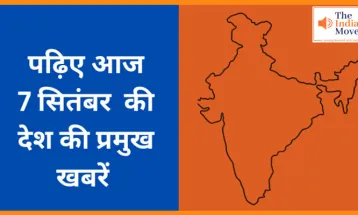
US new tariff laws ; Impact on India
-
 Manjushree
Manjushree
- April 5, 2025
Trump's major economic move - How is India affected?
US President Donald Trump has unveiled the steepest reciprocal tariff proposals on countries like China, India, Australia, escalating the global trade war and sending ripples through the global economy. The sweeping measures are aimed at addressing what he calls unfair trade practices for years. This includes at least 10% tariff on all exporters and even more taxes on 60 other nations.
Trump also declared “Our country has been looted, pillaged, plundered” by other nations, dramatically unveiling a massive board listing the tariff rates imposed on various countries. Previously, Canada and Mexico were among the first nations—alongside China—to face 25% tariffs, which took effect shortly after Trump's initial announcement. But this time, both countries appeared to be absent from his latest round of trade measures, which have escalated global trade tensions and raised concerns about economic instability.
What is Tariff?
A tariff is a tax or duty imposed by a government on imported goods. Importers must pay this duty, which often gets passed on to consumers, making foreign products more expensive. The US has decided to impose new tariffs of up to 27% on Indian goods, effective from April 9, 2025.
What are Reciprocal Tariffs?
Reciprocal tariffs are taxes imposed by a country in response to similar tariffs or high import duties by another country. It is a tit-for-tat trade policy where one country increases duties to counter another’s trade restrictions.
Tariff on India
US President Donald Trump has imposed 27% tariffs on Indian goods, affecting key sectors like steel and auto. This policy change could challenge Indian exports but also presents potential opportunities for strengthening domestic manufacturing, the global trade landscape is now shifting dramatically, signaling a potential rollercoaster ride for the Indian economy as the new fiscal year kicks off. All thanks to Trump's reciprocal tariffs.
Some of the exempted sectors include Pharmaceuticals, semiconductors, energy products (oil, gas, coal, LNG), and copper.
This move comes as Indian Prime Minister Narendra Modi has been actively negotiating a Bilateral Trade Agreement aimed at strengthening trade ties between the two nations.The latest tariffs are a part of the ongoing US-India trade relationship, affecting exports from India to the US. Since the US accounts for 18% of India’s total exports and 10.73% of bilateral trade, the impact could be significant.
Read this also: Trump's New US Tariffs: Who Will Pay & What Comes Next?
Impact on India

The recent developments in trade tariffs are poised to have significant implications for India. One immediate challenge that Indian businesses will face is the higher costs associated with exporting goods to the United States. As Indian products become more expensive due to increased tariffs, there is a potential risk of reduced demand from American consumers and businesses.
Why did Trump impose tariff?
The United States has imposed tariffs for several key reasons. Firstly, the US aims to protect its domestic manufacturing sector by making local industries more competitive in the global market. By imposing tariffs, the Trump 2.0 government hopes to encourage consumers to buy American-made products, thereby boosting local production.
Secondly, the tariffs are part of an effort to reduce the trade deficit, which stood at $35.31 billion with India in the 2023-24 fiscal year. The US is seeking to "balance this gap and promote fairer trade practices."
Lastly, the US has expressed concerns about global trade practices, asserting that certain countries, including India, benefit from unfair trade advantages that distort competition.
A positive side
Additionally, as global supply chains realign, India stands to gain if it can enhance its ease of doing business, improve logistics, and ensure policy stability. Such improvements could position India as an attractive destination for businesses looking to diversify their supply chains.
Moreover, the rise in tariffs may encourage Indian companies to focus more on strengthening domestic manufacturing capabilities. This shift could lead to increased local production and the exploration of new markets beyond the US, fostering a more resilient economic environment.
For more articles visit The India Moves
महत्वपूर्ण खबर
Categories
- देश (2079)
- अपराध (147)
- मनोरंजन (337)
- शहर और राज्य (338)
- दुनिया (847)
- खेल (376)
- धर्म - कर्म (637)
- व्यवसाय (182)
- राजनीति (562)
- हेल्थ (186)
- महिला जगत (55)
- राजस्थान (490)
- हरियाणा (61)
- मध्य प्रदेश (57)
- उत्तर प्रदेश (224)
- दिल्ली (256)
- महाराष्ट्र (169)
- बिहार (183)
- टेक्नोलॉजी (187)
- न्यूज़ (82)
- मौसम (108)
- शिक्षा (115)
- नुस्खे (83)
- राशिफल (374)
- वीडियो (1052)
- पंजाब (35)
- ट्रैवल (19)
- अन्य (45)
- जम्मू कश्मीर (84)
- उत्तराखंड (11)
- तेलंगाना (1)
- छत्तीसगढ (5)
- गुजरात (7)
- हिमाचल प्रदेश (1)
- पश्चिम बंगाल (7)
- असम (0)
- केरल (1)
- झारखंड (2)
- ओडिशा (0)
- त्योहार (18)
Vote / Poll
क्या राजस्थान मे बेरोजगारी का मुद्दा खत्म हो चुका है ..







